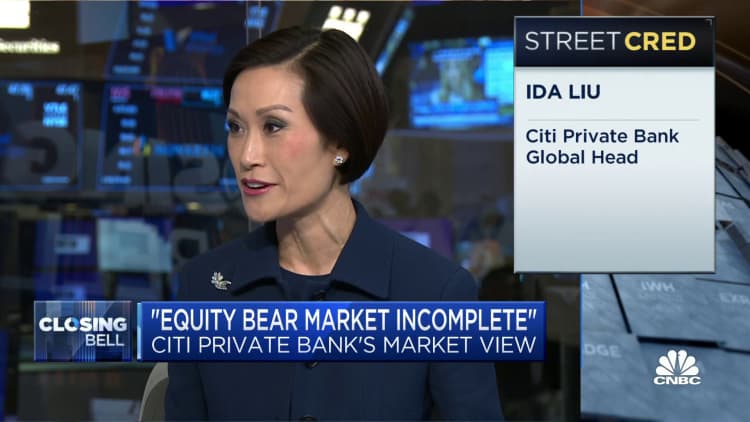[ad_1]

By most measures, the new year is off to a good start. However, economists and business leaders alike predict there are rougher times ahead for the market and the economy.
Year to date, the S&P 500 and Dow Jones Industrial Average have advanced about 4% and more than 2%, respectively, while the Nasdaq Composite is up 5.9%.
Yet inflation remains a persistent problem. The consumer price index for December showed prices cooled 0.1% from the month before but were still 6.5% higher than a year ago.
“The easing of inflation pressures is evident, but this doesn’t mean the Federal Reserve’s job is done,” said Bankrate.com’s chief financial analyst, Greg McBride. “There is still a long way to go to get to 2% inflation.”
Even as the Fed’s battle with inflation is leading to success, it will come at the price of a hard landing for the economy, according to a survey of chief financial officers conducted by CNBC. Economists have been forecasting a recession for months, and most see it starting in the early part of the year.
More from Personal Finance:
Tax season opens for individual filers on Jan. 23, says IRS
Here’s the inflation breakdown for December — in one chart
Life expectancy can have a greater impact on retirement money than inflation
To make the best of the current climate, advisors recommend a few key money moves in the year ahead.
Here are their top four strategies to shield yourself from stock market volatility, rising interest rates and geopolitical risk — not to mention fears of an impending recession.
1. Pay down high-interest debt
“This is a great time to pay down some of those higher interest loans outstanding,” said David Peters, a financial advisor and certified public accountant at CFO Capital Management in Richmond, Virginia.
Credit card rates, in particular, are now more than 19%, on average — an all-time high. Those annual percentage rates will keep climbing, too, as the Fed continues raising its benchmark rate.
“For so long we’ve been pretty spoiled in the markets,” Peters said. In some cases, it used to make financial sense to tap cheap credit for a larger purchase, rather than withdrawing money from a savings or investment account. Now, “we need to reverse our way of thinking.”
Consider this: “If you have a loan with an interest rate of 6% and you pay the principal down on the loan, it is almost the same as getting a 6% return on your money in the markets,” he said.
If you currently have credit card debt, “grab one of the zero-percent or low-rate balance transfer offers,” McBride advised. Cards offering 15, 18 and even 21 months with no interest on transferred balances are still widely available, he said.
2. Put your cash to work
Once you’ve paid down debt, Peters recommends setting some money aside in a separate savings account for emergency expenses.
“Online savings accounts can be a way to earn money in times when other investments may not be returning well,” he said.
However, although some of the top-yielding online high-yield savings accounts are now paying more than 3.6%, according to DepositAccounts.com, even that won’t keep up with the rising cost of living.
Ted Jenkin, CEO at Atlanta-based Oxygen Financial and a member of CNBC’s Advisor Council, recommends buying short-term, relatively risk-free Treasury bonds and laddering them to ensure you earn the best rates, a strategy that entails holding bonds to the end of their term.
“It’s not a huge return but you are not going to lose your money,” he said.
Another option is to purchase federal I bonds, which are inflation-protected and nearly risk-free assets.
I bonds are currently paying 6.89% annual interest on new purchases through April, down from the 9.62% yearly rate offered from May through October 2022.
The downside is that you can’t redeem I bonds for one year, and you’ll pay the last three months of interest if cashed in before five years.
3. Boost retirement contributions
Once you’ve paid down high-interest credit card debt and set some money aside, “putting more into your retirement accounts right now can be a great move,” Peters said.
You can defer $22,500 into your 401(k) for 2023, up from the $20,500 limit in 2022. The new provisions in “Secure 2.0” will further expand retirement plan access and open up more opportunities to save going forward, Peters said, including making it easier for employers to make contributions to 401(k) plans on behalf of employees paying down student debt.
Even if you’re balancing contributions with short-term goals, you should still contribute enough to take full advantage of company matches, he added, which is like getting an additional return on your investment.
4. Buy the dip
“Investors willing to take on additional risk might consider ‘buying the dip’ by looking at sectors that took an especially hard it and could now be undervalued,” said certified financial planner Bryan Kuderna, founder of the Kuderna Financial Team in Shrewsbury, New Jersey, and the author of the upcoming book, “What Should I Do with My Money?”
“Tech took it on the chin, Amazon lost half their market cap, if there was too much of a pullback there may be opportunity,” he said.
Kuderna recommends dollar-cost averaging, which helps smooth out price fluctuations in the market. Investing in set intervals over time can also help you avoid emotional investing decisions.
However, a long-term horizon is critical to this type of approach, Kuderna added, which means being prepared to leave that money alone.
“The overall advice I have is don’t watch the market too closely, that’s when people start to get emotional and that’s when mistakes happen.”
[ad_2]
